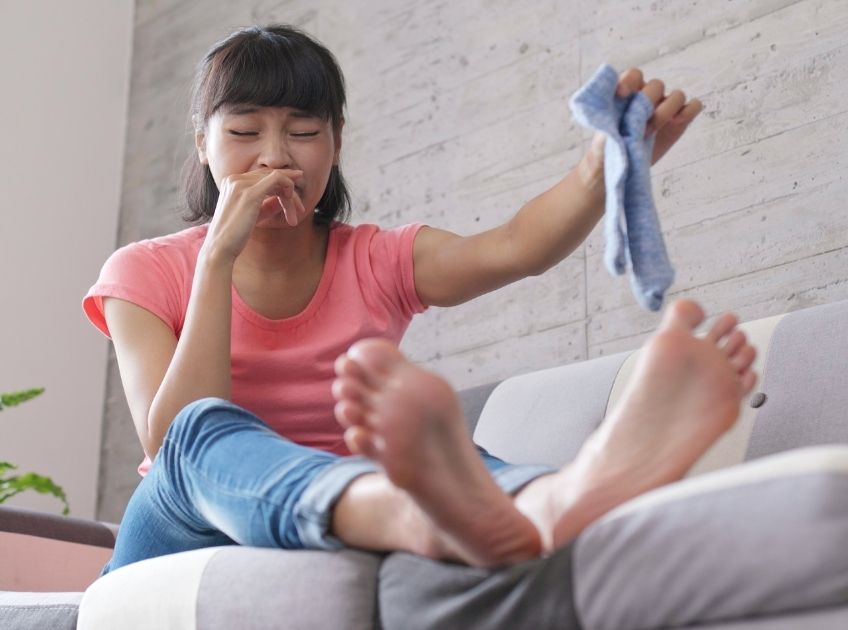
Important: This article is for informational purposes only. Please read our full disclaimer for more details.
Smelly feet can be embarrassing, but they’re a common issue faced by millions. The odor—scientifically called bromodosis—often results from sweat mixing with bacteria that thrive in warm, moist environments. While occasional foot odor is normal, persistent smell can signal poor hygiene, fungal infections, or even excessive sweating (hyperhidrosis). The good news? You can tackle smelly feet easily with natural remedies, proper hygiene, and, when needed, medical treatments.
What Causes Smelly Feet? The Hidden Culprits
Before jumping into solutions, it helps to understand what’s causing that unpleasant odor.
- Excessive sweating: Feet have over 250,000 sweat glands. When sweat accumulates in socks or shoes, it creates a breeding ground for odor-causing bacteria.
- Bacteria and fungi: Brevibacterium linens and Staphylococcus epidermidis are common bacteria responsible for that distinctive “cheesy” smell. Fungal infections, like athlete’s foot, can worsen the odor.
- Poor ventilation: Tight shoes and synthetic socks trap heat and moisture, allowing bacteria to multiply.
- Hormonal changes: Teens and pregnant women often experience increased sweating due to hormonal fluctuations.
- Poor hygiene: Not washing feet daily or wearing the same shoes without allowing them to dry can cause a buildup of bacteria.
Tried-and-True Home Remedies to Banish Foot Odor
Nature offers several effective and affordable ways to freshen up your feet:
1. Soak in Vinegar or Epsom Salt
- Mix 1 part vinegar with 2 parts warm water and soak your feet for 15–20 minutes.
- Vinegar’s acidity kills odor-causing bacteria. Epsom salt soaks help reduce moisture and inflammation.
2. Baking Soda Foot Bath
- Add 2–3 tablespoons of baking soda to warm water and soak for 15 minutes.
- It neutralizes odor and restores the skin’s pH balance.
3. Tea Foot Soak
- Steep 4–5 black tea bags in hot water, cool it slightly, and soak your feet for 20 minutes.
- Tannins in tea help close pores and kill bacteria.
4. Use Tea Tree Oil
- Add a few drops to a carrier oil and massage into clean feet.
- Tea tree oil’s natural antifungal and antibacterial properties make it a great odor-fighting solution.
5. Keep Feet Dry and Clean
- Wash feet daily, dry thoroughly (especially between toes), and use antifungal foot powder if needed.
- Moisture-wicking socks made of cotton or bamboo can help reduce sweat.
6. Change Socks and Shoes Frequently
- Rotate shoes to let them air out and always wear fresh socks.
- Sprinkle baking soda or cornstarch in shoes to absorb excess moisture.
Medical Treatment Options for Persistent Foot Odor
If home remedies aren’t enough, professional treatments can help eliminate the root cause:
1. Antibacterial or Antifungal Creams
- Over-the-counter creams, sprays, or powders can treat infections causing odor.
- Products with clotrimazole or terbinafine are effective for fungal issues.
2. Prescription-Strength Antiperspirants
- Doctors may recommend aluminum chloride-based roll-ons to reduce excessive sweating.
3. Iontophoresis
- A noninvasive treatment using mild electrical currents to temporarily block sweat glands.
4. Botox Injections
- For severe hyperhidrosis (excessive sweating), Botox injections can reduce sweat production for several months.
Sweaty Feet: When It’s More Than Just Odor
Chronic sweaty feet, known as plantar hyperhidrosis, can significantly increase odor issues and discomfort.
- Symptoms: Constantly damp feet, shoe slipping, skin peeling, or frequent infections.
- Treatment: Medical-grade antiperspirants, oral medications (anticholinergics), or advanced procedures like Botox or iontophoresis may be prescribed.
- Prevention: Choose breathable shoes, moisture-wicking socks, and practice daily foot hygiene.
When to See a Doctor
- If your foot odor persists despite consistent care, it’s time to seek medical help. You should consult a doctor if:
- The odor is accompanied by itching, redness, or skin peeling (possible fungal infection).
- You experience excessive sweating that affects daily life.
- There are open sores, cracks, or persistent pain in your feet.
- You have diabetes and notice any unusual foot odor or wounds—this can indicate infection and requires urgent care.
Scientific Evidence and Expert Insights
Dermatological studies confirm that bromodosis primarily results from bacterial metabolism of sweat. Research in the Journal of Dermatological Science highlights that Brevibacterium species thrive in moist environments like feet and produce sulfur compounds that cause strong odors (1)(2). Clinical findings also support the use of topical antimicrobial agents and aluminum chloride antiperspirants to manage foot odor effectively (3).
Experts emphasize maintaining hygiene, choosing breathable footwear, and using antibacterial soaps as the most reliable preventive strategies.
Frequently Asked Questions (FAQ’S)
1. Can smelly feet be a sign of a health problem?
A. Yes. Persistent odor can indicate fungal infections like athlete’s foot or conditions such as hyperhidrosis.
2. How often should I wash my feet to prevent odor?
A. Wash daily with antibacterial soap and thoroughly dry before wearing socks or shoes.
3. Do insoles or sprays help?
A. Yes. Activated charcoal insoles and antibacterial foot sprays can help absorb moisture and neutralize odor.
Smelly feet are nothing to be ashamed of—and they’re entirely treatable. By combining simple home remedies with good hygiene and, when necessary, medical treatments, you can eliminate odor and keep your feet feeling fresh all day. Remember, prevention is key: keep your feet clean, dry, and well-ventilated. With the right care, you can confidently step out without a trace of worry—or smell.















